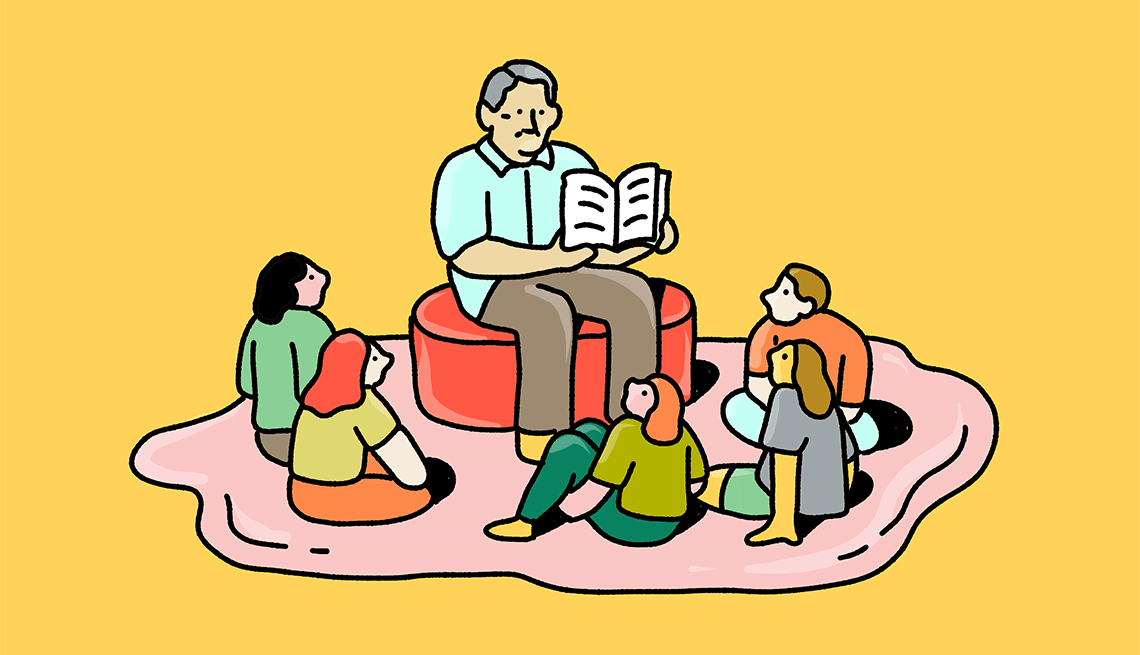AARP Hearing Center


With the tagline “Gramps, Not Grumps,” Frank Williams Jr. and Jim Isenberg, friends for 30 years and both grandparents, launched Grandpas United, a volunteer organization that connects older adults with children in need of mentorship.
Williams, 72, says the organization, started in 2018 in White Plains, New York, has helped change the way younger people see their elders, and how older adults view themselves.
As valuable as the work is for the children, it’s equally rewarding to the volunteers. A January 2025 study published in the journal Social Science & Medicine found that giving back as a volunteer not only makes older people feel younger but also stymies the aging process, leading to better mental and physical health.
Here are 25 more great things about volunteering.
1. You can follow your heart
With a traditional 9-to-5 job, your main goal might be to pay the bills. With volunteering, however, it’s about devoting hours to organizations you believe in.
And it’s important that you volunteer for something that’s close to your heart. “Start with your passion, because that’s what you’re going to stay connected to,” says Tonya Wiley-Robinson, 60, AARP’s director of volunteer initiatives and operations optimization.
Vonetta Dotson, chief of the division of neuropsychology at Mass General Brigham, says dedicating your time to a passion project can be more meaningful than work done out of obligation. That fulfillment carries over into your health as well. “In older adults, feeling that life has meaning supports both brain health and overall physical well-being,” says Dotson.
2. It adds purpose to your life
Nadine Kaslow, 68, a psychology professor at Emory University, says you don’t need a degree to understand what draws her to causes like Ronald McDonald House, an organization that supports families while children who are ill undergo treatment.
“It gives me a sense of purpose and meaning,” says Kaslow, who in 2013 received Emory’s highest honor for serving her community. “We know that purpose and meaning are things that really sustain us.”
A 2022 study published in the International Journal of Environmental Research and Public Health supports Kaslow’s point, stating that “Having a purpose provides an intrinsic motivation to adopt healthy behaviors as we age, which will help us to achieve positive health outcomes.”
3. You keep loneliness at bay
Volunteering is valuable for older individuals who are susceptible to the effects of loneliness, which was deemed an epidemic in 2023 by the U.S. Surgeon General. “There’s something about isolation which is toxic. It engenders loneliness,” says John W. Rowe, 80, a professor of health policy and aging at Columbia University. “It’s something that can be deeply mitigated by interactions with other people.”
4. Gets you up and moving
Williams says too many older adults are apt to lounge in a chair with the television on rather than do something productive. That’s why he champions volunteering.
“Sitting around has no purpose or meaning,” he says. The 2025 study from Social Science & Medicine found volunteering to be associated with lowered hypertension and chronic inflammation, while assisting with stress regulation, cognitive function and the ability to perform daily functions.
Such positive outcomes tie into the Centers for Disease Control and Prevention’s recommendations for staying active when older. Among the immediate impacts of staying active are improved sleep and lower blood pressure, according to the CDC’s website. Long-term benefits include reducing the risks of developing dementia, heart disease and eight types of cancer.


5. Your schedule is up to you
Among the biggest perks of donating your time is that you remain in control of your schedule. If you are someone who has a full-time job or wouldn’t want to miss your pickleball or swimming sessions, you can adapt volunteering to your regular routine.
And you can do it as much or as little as you like and are able. You can volunteer one hour per week or help out every day and still make a difference, says Wiley-Robinson.
However, retired people should not feel the need to fill their days volunteering, says Jennifer Bennett, 54, director of education and training at Idealist, an online portal for potential volunteers to find organizations to which they can contribute. Bennett suggests first giving it a try to see if it’s a good fit before committing to many hours. “My recommendation for people is to look for some of those shorter-term volunteer opportunities and then see if that’s a place that [they] might want to spend more time,” she says.
6. Reduces your stress levels
Richard Leider, author of 12 books including three bestsellers centered on finding purpose (including The Power of Purpose), says many individuals — particularly those nearing the end of life — suffer stress because they’re afraid their life has not had enough meaning. “When people feel like they’re growing and giving for life, it reduces that anxiety,” says Leider, 81. “Mattering matters, and volunteerism helps them matter.”
Dotson says the feelings of fulfillment people get from volunteering trigger chemicals related to happiness like serotonin, dopamine and endorphins that counteract stress or anxiety. “Volunteering helps reduce feelings of isolation and loneliness by fostering meaningful interactions with others and strengthening social skills through shared activities,” Dotson explains. “It also offers a powerful sense of purpose and fulfillment, as working toward a common goal can boost self-confidence and improve mood. All of these benefits help to reduce feelings of stress and anxiety.”
It’s also beneficial to those with dementia. A 2024 study published in Geriatrics found that increased physical and mental activity assists with reduced anxiety and increased well-being of individuals living with dementia.
7. Slows the aging clock
While volunteering can’t stop the aging process, the phenomenon of feeling younger from doing good deeds is real. The 2025 research in Social Science & Medicine suggested that a moderate amount of volunteer work may be enough to slow the aging process at the biological level, allowing for more years of living a healthier and more active lifestyle.
“Volunteering can make older adults feel younger by enhancing their physical health, mental sharpness and emotional resilience,” says Dotson, who is also the president and CEO of CerebroFit Integrated Brain Health, a start-up company that assists older individuals with their memory and thinking abilities. She notes that giving back “boosts self-worth and combats feelings of uselessness or isolation that can come with retirement or aging.”
8. You’ll sleep better at night
Regular volunteering can add routine to your day, and that means better sleep. “Maintaining consistent times for waking and going to bed can help you get better rest,” according to Northwest Medicine, a nonprofit health care system affiliated with the Northwestern University Feinberg School of Medicine.







































































You Might Also Like
Consider Acupuncture to Ease Your Pet’s Stresses and Strains
This ancient Chinese practice is gaining popularity among veterinarians
Understanding Why Adult Siblings Disagree
Adult siblings often clash over jealousy and resentment